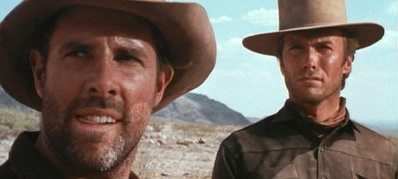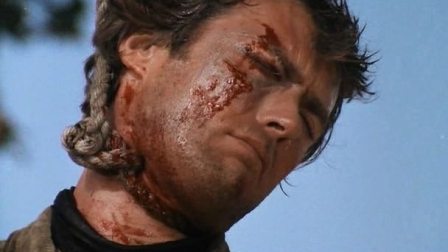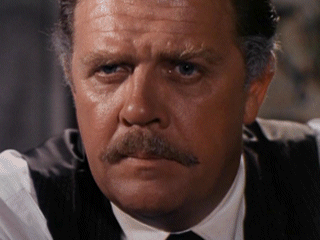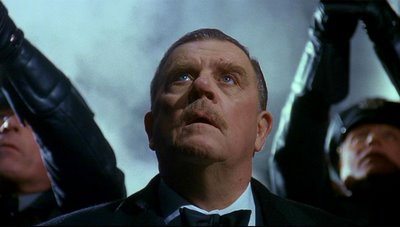It all comes down to justice. Justice and the squirrelly soul of Commissioner Gordon.
That’s what I learned from first watching Hang ’em High and then mulling over The Dark Knight Rises. (Why would I do something so irrational? Read about it.)
And, in case you’re impatient, here’s what I gleaned:
Christopher Nolan is in trouble.
Why? Because he’s making a film that deals with justice. Now, our friend justice is a slippery fish in normal situations. When you’re talking about an extra-legal character like the Batman, however, and you’re trying to have him symbolize some form of ‘justice,’ what you’ve got is a seriously oily smelt.
So I’ll tell you a little story about a man who returns from the dead to seek justice. Only he finds justice isn’t so easily acquired or even understood.
Hang ’em High
In Hang ’em High, Clint Eastwood’s Jed Cooper drives cattle through the Oklahoma Territory. A posse led by Captain Wilson catches him, mistakes him for a rustler, and strings him up. Oops. Sorry dude.
Luckily, the posse leaves him for dead (not a commonly used phrase). A deus-ex-marshal cuts Jed down in time and brings him to Judge Fenton (Pat Hingle). Jed is issued a tin star and set loose to seek revenge, justice, whatever—as long as he operates under Fenton’s rules.
What are Fenton’s rules? Bring them in alive so I can make their hanging a public spectacle.
It’s actually a pretty twisted ethical mind-fuck.
What makes a hanging ordered by Judge Fenton any better than a hanging instigated by Captain Wilson? Judge Fenton is, we presume, credentialed. He represents the Oklahoma Territory, but it’s not even a state yet. Also, as we see in the film, he isn’t particularly forgiving, subtle, or even just. A drunken sex-offender is hung. Boys who rustled cattle are hung. Some guy with an overdue parking ticket is hung. Hanging is a panacea in the Oklahoma Territory.
There is a law. Fenton will enforce it. That will help make Oklahoma a state. End, means, check please.
Fenton bemoans the lack of a higher power to stay his hanging hand. He says he wishes there was someone to tell him that he’s wrong when he’s wrong, but there isn’t and so hang ‘em all.
I say: nuts.
I say Judge Fenton is no different from Captain Wilson.
Trapped between them is Jed Cooper. He seeks yet another version of justice, his own. He’s got a badge of office, but his personal vendetta drives him, not the law.
The plot fractures as Cooper runs into various distractions. There’s a murderous rustler (Bruce Dern) who’s guilty of precisely the charges Cooper faced. A vengeful widow (Inger Stevens), a really stupid picnic, etc. Jed tries to stay his vengeful course, but presumably learns that real justice can’t be subjective. (Or that’s what I want him to learn, at least).
When, finally, Cooper requests mercy for one of the men who lynched him, he’s told unless he keeps wearing his marshal’s badge—enforcing Fenton’s version of justice—the man will die.
You’re asking: so what?
So what about Batman!
What about Batman
If I start thinking about The Dark Knight Rises on top of all this, it makes for some interesting questions. I’ll pose three for you.
1) How, if Batman represents justice but not the law, is he any better than a member of Captain Wilson’s posse?
Think about it: who were Jed’s assailants and what did they want? It’s quite clear; they were vigilantes seeking justice, like Batman. They took the law into their own hands to bring a chaotic society under control, like Batman. Just, as it turns out, their justice was flawed (that’s right: like Batman’s). It’s unsurprising. All subjective justice is flawed and all justice is subjective.
2) If Batman prevails, is he doing anything more than imposing the justice of the mighty on the weak?
Jed is given a tin star and so when he has someone hanged, it’s legal—even though most of the men he tracks down are only guilty of trusting the wrong leader. Even more confusingly, the man Jed gets his authority from, Judge Fenton, seems as quick to condemn as Captain Wilson was. So what is justice but the reckoning of the mighty? And… speaking of reckoning: what does Bane claim to be in TDKR trailer? That’s right. “Gotham’s reckoning.” Will he also don the mantle of justice? Is that what that stupid mask that blocks THE ACTOR’S FACE AND VOICE is?
3) What can Christopher Nolan do to avoid the noose Hang ‘em High strings for itself?
Hang ‘em High appears to throw up its hands in the end, letting Jed choose the lesser of evils. He opts to support Judge Fenton’s version of justice because—fascinatingly—the judge will PERVERT IT for Jed in exchange for Jed’s continued allegiance.
That’s seriously messed up.
In Nolan’s Batman films, Commissioner Gordon is also ‘forced’ into corrupting his own sense of justice in order to achieve his goal—he frames Batman for Harvey Dent’s crimes. That may be practical, but it’s certainly not just.
If Nolan follows Hang ’em High’s lead, we’ll get an equally unsatisfying ending. And that’s my fear. Nolan has big ideas and sometimes he executes them coherently. Sometimes, like with the third act of The Dark Knight, we get something too representational and not remotely realistic. I’m talking about the whole mess with the ferries which I didn’t believe for a moment.
Certainly we’ll get a Bane vs. Batman finale. Will one of them be brought to justice? Or, if we’re lucky and Nolan is smart, both of them? Whose justice will it be?
My bet: Commissioner Gordon.
Bonus Points:
I’ve got a good reason for seeing Commissioner Gordon as the heir to Judge Fenton and the best representative of justice. That reason is the actor who portrays the Judge, Pat Hingle.
Look familiar? Did you spot it when you watched it? Yes. That’s right. Pat Hingle played COMMISSIONER FREAKIN’ GORDON in ALL FOUR of the Tim Burton-spawned Batman movies. Gordon also, like Fenton, gets all the juicy speeches about justice.
So chew on that slippery fish.





Having actually watched Hang ’em High, I’d like to have something intelligent to add here, but I can’t quite get my head around it all at present. HEH was certainly trying to say all those things about justice, but what with the picnics and Bruce Dern and so forth, it never seemed to actually know what it meant. Or something.
But yeah. Justice. It is indeed necessarily subjective, since it’s only ever we mere humans deciding what it means and how to apply it. Batman, like most superheroes, is a kind of vigilante, but since he seems more well-meaning than, say, Charles Bronson, we give him a pass. As for the new Dark Knight movie, I’m not sure what they’re going to be saying about the matter, but you’re right, Nolan better have a clearer vision than HEH presented, or there’s going to be trouble.
Yep. I did my best to make sense of HEH, but as you see above… even thinking about it for a few days and writing a number of drafts of this, all I could put into words was: “Justice is complicated and subjective.”
I do think there are interesting parallels between the two stories; but only enough to suggest pitfalls for Nolan, not enough to show him a way to salvation.
Pingback: I Am Going to Act Your Pants Off | Stand By For Mind Control·
Pingback: Like A Bad Soufflé, The Dark Knight Rises Falls Flat | Stand By For Mind Control·